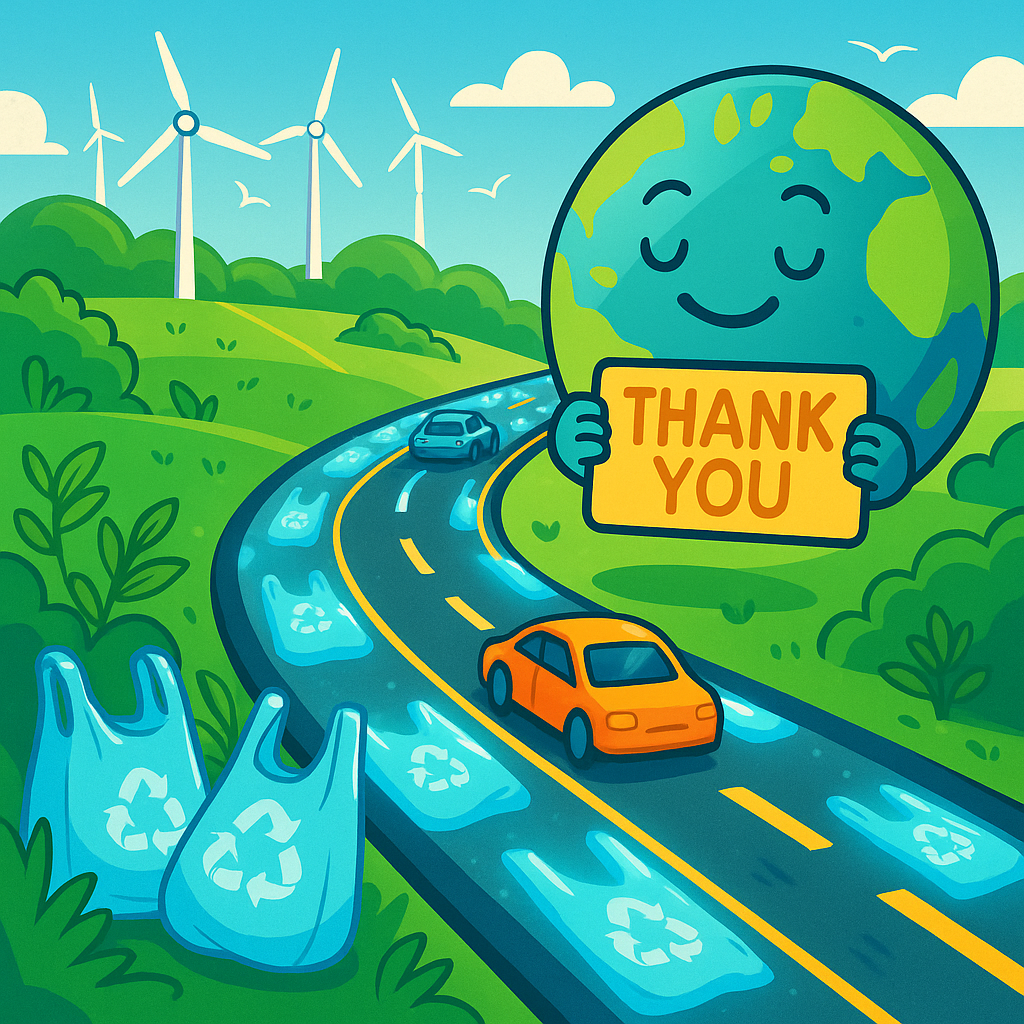
Recycling One Of The World's Biggest Polluters — Plastic Bags — Into Asphalt To Help Create Vital Infrastructure Around The World
♻️ Innovation Meets Trash: The Plot Twist We Needed 🌎🛣️
Imagine driving your electric car down a smooth highway — made of old grocery bags, milk bottles, and regret.
Well, thanks to brilliant scientists (and maybe a little guilt from humanity’s plastic addiction), that future might be closer than you think.
🧠 Researchers at Edith Cowan University have discovered that single-use plastics — the villains of modern pollution — can actually be melted into asphalt to create stronger, longer-lasting roads.
That’s right: plastic bags are going from shopping to paving.
💡 Turning Bags Into Black Gold
PhD researcher Ali Ghodrati and his team found that thermoplastics like those in milk bottles and shopping bags melt nicely at asphalt-mixing temperatures — without releasing as many toxic byproducts.
When blended properly, they strengthen the asphalt and even increase its longevity.
So next time you walk through a parking lot, you might actually be stepping on what used to be last week’s grocery run.
Take that, landfill.
“Recycling these plastics into pavement not only offers a practical solution to plastic pollution,” said Ghodrati, “but also enhances the strength and longevity of our roads.”
Translation: we’re building highways out of yesterday’s bad decisions.
🌊 The Scale of the Plastic Problem (and the Promise)
Every year, 500 million tons of plastic are produced — and only 9% is recycled.
The rest? It ends up in landfills, rivers, oceans, and occasionally… inside fish that end up back on your dinner plate. 🐟🍽️
-
🛍️ Each American uses 365 plastic bags per year — one per day, like a depressing calendar of waste.
-
🌍 The world uses about 5 trillion bags annually.
-
🕐 Average plastic-bag lifespan: 12 minutes.
-
⏳ Environmental lifespan: Forever.
With over 170 trillion pieces of plastic estimated to be floating in the ocean, even a partial recycling breakthrough like this one is a road-sized step forward.
💰 From Pollution to Pavement: Why It Matters Economically
Plastic pollution doesn’t just choke turtles — it chokes budgets, too.
Economic Costs:
-
🧹 Cities spend billions annually cleaning up litter.
-
🛢️ 8% of global petroleum output goes into making plastic bags.
-
💸 Tourism takes a hit when beaches look like confetti dumps.
Environmental Costs:
-
🐢 Wildlife dies from ingestion and entanglement.
-
🌧️ Clogged drains lead to flooding.
-
💨 Burning or burying plastic releases toxins into air and soil.
Social Costs:
-
🧍♀️ Low-income communities bear the brunt of plastic pollution exposure.
-
🧠 Health risks arise from microplastics and airborne chemicals.
So if asphalt-infused plastic can replace even a small fraction of waste — we’re not just paving roads, we’re paving the way to a saner planet.
🏗️ The Road Ahead (Literally)
Not all plastics are created equal — some can be safely used for roads, others can’t.
The key is thermoplastics: materials that melt easily and integrate into asphalt without compromising quality.
Governments and companies are now exploring pilot projects in Australia, India, and the U.S., aiming to test large-scale applications.
If these succeed, it could spark a new global industry turning plastic waste into infrastructure — possibly even reducing dependency on traditional asphalt binders derived from oil.
Asphalt already boasts a 99% recycling rate in the U.S., according to the Federal Highway Administration.
Combine that with plastic recycling, and we might have the most eco-efficient infrastructure ever built.
🌍 From Fun Facts to “Plastic Realities”
-
🛍️ A single bag’s average use time: 12 minutes.
-
🧬 Plastic never truly biodegrades — it just gets smaller (and sneakier).
-
⚰️ Around 25 children die each year in the U.S. from accidental suffocation with plastic bags.
-
🛢️ 12 million barrels of oil a day are used globally to make and power plastic bag production.
-
🧾 Every “free” bag at checkout actually costs the planet billions.
😄 The Funny Side (Because Crying Alone Isn’t Productive)
Who would’ve thought plastic bags would find redemption?
They’ve been the bad guys for decades — clogging drains, killing dolphins, haunting your kitchen drawer.
But now? They’re finally getting a glow-up as infrastructure heroes.
It’s the ultimate comeback story:
From suffocating turtles to supporting Teslas.
🔗 A Couple of Smart (and Fun) External Links
-
TechXplore – “Turning shopping bags into streets”: the original Edith Cowan University report on the research that inspired this piece.
→ Read it here
“Because if plastic bags can become asphalt, maybe that drawer full of old chargers can too.” -
UNEP Plastic Pollution Report: Learn how global efforts to curb plastic waste are scaling.
→ Check it out on the United Nations site
“Warning: reading this may cause an uncontrollable urge to carry a reusable tote.”
🧩 Quick Take / TL;DR
-
🛍️ Researchers found that shopping bags + milk bottles = stronger asphalt roads.
-
🌎 Plastic bags could soon power global infrastructure projects.
-
💸 Solves pollution and strengthens roads? That’s the best two-for-one deal since Taco Tuesday.
-
⚠️ Still early-stage — real-world testing ongoing.
-
😄 Verdict: Promising, poetic, and a little bit hilarious.
❓ FAQ
Q: Are these roads actually safe and durable?
A: Early tests suggest yes — they’re stronger than conventional asphalt and may last longer. Still, larger-scale trials are in progress.
Q: Does this solve plastic pollution?
A: Not entirely, but it's a great start: a Band-Aid for a gaping wound — and at least it’s a recycled Band-Aid.
Q: Will we be driving on plastic highways soon?
A: Pilot projects are already underway! So yes, maybe one day your commute will be paved with yesterday’s lunch bag.
Q: What about emissions when melting plastic?
A: Thermoplastics like HDPE and LDPE melt cleanly at lower temps. Researchers aim to minimize toxic byproducts through controlled processes.
🧠 Conclusion
Recycling plastic bags into roads isn’t just smart — it’s poetic justice.
We took something worthless, wasteful, and universally hated — and turned it into a literal foundation for progress.
As one FUNanc1al reader put it best:
“The planet’s finally getting something back from all those grocery runs.”
🧾⚠️📢 Disclaimer: 🧾⚠️📢
This article contains traces of optimism and biodegradable humor. 🌱
We love science — but please, don’t melt plastic bags in your backyard.
Let the professionals build the highways… you just enjoy the ride (preferably on recycled asphalt). 🛣️♻️
We smile, we analyze, we meme.
We sell jokes and opinions — and yes, we’re billing your sense of humor. 🎪💸💥
Invest at your own risk. Love at any pace. Laugh at every turn. 😄
🧭 Want More Like This?
👉 Head over to our Tech & Innovation Hub or our News & Perspectives with a Different Lens hub
👉 Browse our Funanc1al Wellness Hub for body insights with a wink and a plank
👉 Explore our Foodies Travel Hub for even more fun!
👉 Check our satirical finance series: “We the Spenders” (Coming soon)
👉 Or explore our Funanc1al Political Humor Roundup (Due anytime, if you dare to go deep)
👀 Want to stay relevant (and entertained)?
Visit Funanc1al.com — because we cover serious ideas with unserious emoji.
Other articles:
Quick links
Search
Privacy Policy
Refund Policy
Shipping Policy
Terms of Service
Contact us
About us
FUNanc!al distills the fun in finance and the finance in fun, makes news personal, and helps all reach happiness.
